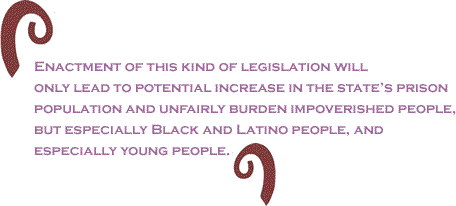Let�s
be clear: the 3 strikes crime bill being proposed for
Massachusetts has nothing to do with the stopping or reduction
of crime.� If not for the kind of long-enduring negative
impacts on people and families, and communities, the proposal
could be described as silly.� We cannot describe it as
silly, however, because there is a proven history of destruction
of lives and communities associated with 3 strikes provisions
in other states, at the same time that it has proven worthless
in the reduction of crime.� Enactment of this kind of
legislation will only lead to potential increase in the
state�s prison population and unfairly burden impoverished
people, but especially Black and Latino people, and especially
young people.�� It is a proposal that contradicts recent
and widespread efforts to reform the Criminal Offender
Record Information (CORI),
a system that is being acknowledged as a failure by increasing
numbers of people and legislators in Massachusetts.��
A report issued by the Justice Policy
Institute, Three Strikes
and You�re Out, reports that such legislation
has led to many people being incarcerated for relatively
minor crimes.� In California, two-thirds of all persons
imprisoned under its 3-Strikes law, committed nonviolent
crimes.� Based on FBI crime rates reported, it was found
that between 1993 and 2002, violent crime in 3-Strike
states fell by 33%; in non 3-Strike states, however, crime
decreased by 34.3%.� In lieu of the failure of the 3-Strikes
approach as crime prevention, why are our state legislators
considering a strategy that has been discarded by many
organizations and professionals involved with designing
anti-crime strategies?�� And, why are our state legislators
so anxious to adopt legislation that will have the effect
of increasing racial divisions in the state?� The adoption
of this kind of law will doubtless be �colorblind�.� But
in its implementation it will adversely affect communities
of color which tend to have significantly greater numbers
of people without the resources to pay for defending themselves,
or their children, in response to accusations of crime.�
And, let�s be honest here: or have the resources to change
or challenge, or even delete records of crime.�

This is not a game.� It is irresponsible at worst and goblin
at best, to propose that - just like in baseball - when
a hitter has three strikes he is out.� What a seductive
but dangerous analogy, and arbitrary template, for the
administration of justice and fairness.�
Acknowledgement: This article first appeared in a special
issue published in Boston�s Blackstonian,
�Say No to 3 Strikes Law in Massachusetts� (February/March
2012).

BlackCommentator.com Editorial
Board Member Dr. James Jennings, PhD is a Professor of
urban and environmental policy and planning at Tufts University. Click
here to contact
Dr. Jennings.

